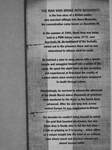1.067.081
kiadvánnyal nyújtjuk Magyarország legnagyobb antikvár könyv-kínálatát

VISSZA
A TETEJÉRE
JAVASLATOKÉszre-
vételek
The Man Who Broke into Auschwitz
| Kiadó: | Hodder & Stoughton Ltd |
|---|---|
| Kiadás helye: | London |
| Kiadás éve: | |
| Kötés típusa: | Ragasztott kemény papírkötés |
| Oldalszám: | 263 oldal |
| Sorozatcím: | |
| Kötetszám: | |
| Nyelv: | Angol |
| Méret: | 24 cm x 16 cm |
| ISBN: | 978-1-444-71416-6 |
| Megjegyzés: | Néhány fekete-fehér fotót tartalmaz. |
naponta értesítjük a beérkező friss
kiadványokról
naponta értesítjük a beérkező friss
kiadványokról
Előszó
TovábbFülszöveg
'This is a most important book, and a timely reminder of tlie dangers that face any society once intolerance and racism take hold.'
SIR MARTIN GILBERT
M, A BRITISH SOLDIER AND PRISONER OF WAR, protected until now by the Geneva Convention, looked down at my new uniform of formless, sack-like garments with their dirty blue stripes and yellow star. Under the eyes of the SS guards, I passed through the gates. It was eariy evening in the late spring of 1944 when I entered Auschwitz III willingly and of my own volition.'
THE MAN WHO BROKE INTO AUSCHWITZ is the true story of a British soldier who marched willingly into Buna-Monowitz, the concentration camp known as Auschwitz III.
In the summer of 1944, Denis Avey was being
held in a POW labou^ camp, E715, near ^Auschwitz IIL He ha^l^heard 6f the brutality meted out to the prisoners there and he was determined to witness what he could.
He hatched a plan to swap places with a J^wteh innil^te and smuggled himself into... Tovább
Fülszöveg
'This is a most important book, and a timely reminder of tlie dangers that face any society once intolerance and racism take hold.'
SIR MARTIN GILBERT
M, A BRITISH SOLDIER AND PRISONER OF WAR, protected until now by the Geneva Convention, looked down at my new uniform of formless, sack-like garments with their dirty blue stripes and yellow star. Under the eyes of the SS guards, I passed through the gates. It was eariy evening in the late spring of 1944 when I entered Auschwitz III willingly and of my own volition.'
THE MAN WHO BROKE INTO AUSCHWITZ is the true story of a British soldier who marched willingly into Buna-Monowitz, the concentration camp known as Auschwitz III.
In the summer of 1944, Denis Avey was being
held in a POW labou^ camp, E715, near ^Auschwitz IIL He ha^l^heard 6f the brutality meted out to the prisoners there and he was determined to witness what he could.
He hatched a plan to swap places with a J^wteh innil^te and smuggled himself into ftse^rj^^ibe:: caiinp. He spent the night there oiii IMfQ occ^ions arid experienced at first-hand the cruelty of , a place where slave workers had bi^n sentenced il,>n;i: to death through labour.
Astoii^shingly, he survived to witness the aftermath of |he Death March where thousands of prisoners #ieije murdered by the Nazis as the Soviet Army advanced. After his own long trek across \' central Europe he was reAjwiated^to-Britain. ^
For decades he couldn't bring himself to revisit
the past that haunted his:i|reams> but now ' Denis Avey is finally able to tell the full stpiy a tale as gripping as it is moving - which offers us a unique insight into the mind of . an ordinary ifian whose moral and physical courage Vissza
Témakörök
- Idegennyelv > Idegennyelvű könyvek > Angol > Szépirodalom > Regény, novella, elbeszélés
- Szépirodalom > Regény, novella, elbeszélés > Az író származása szerint > Európa > Nagy-Britannia
- Szépirodalom > Regény, novella, elbeszélés > Tartalom szerint > Történelmi regények > Legújabb kor > II. világháború
- Szépirodalom > Regény, novella, elbeszélés > Tartalom szerint > Történelmi regények > Koncentrációs táborok, holokauszt
- Szépirodalom > Regény, novella, elbeszélés > Tartalom szerint > Életrajzi regények > Önéletrajzok, naplók, memoárok






